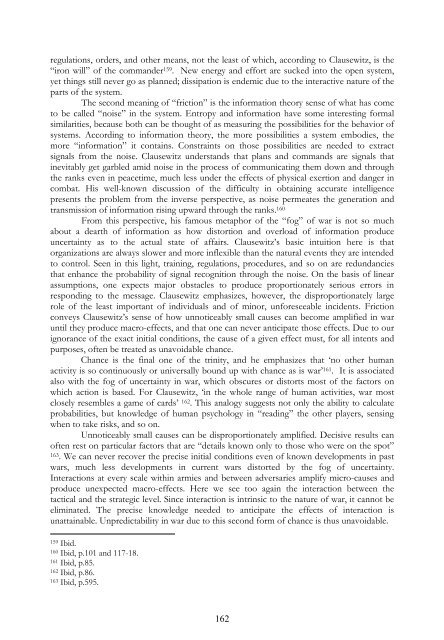Science, Strategy and War The Strategic Theory of ... - Boekje Pienter
Science, Strategy and War The Strategic Theory of ... - Boekje Pienter
Science, Strategy and War The Strategic Theory of ... - Boekje Pienter
You also want an ePaper? Increase the reach of your titles
YUMPU automatically turns print PDFs into web optimized ePapers that Google loves.
egulations, orders, <strong>and</strong> other means, not the least <strong>of</strong> which, according to Clausewitz, is the“iron will” <strong>of</strong> the comm<strong>and</strong>er 159 . New energy <strong>and</strong> effort are sucked into the open system,yet things still never go as planned; dissipation is endemic due to the interactive nature <strong>of</strong> theparts <strong>of</strong> the system.<strong>The</strong> second meaning <strong>of</strong> “friction” is the information theory sense <strong>of</strong> what has cometo be called “noise” in the system. Entropy <strong>and</strong> information have some interesting formalsimilarities, because both can be thought <strong>of</strong> as measuring the possibilities for the behavior <strong>of</strong>systems. According to information theory, the more possibilities a system embodies, themore “information” it contains. Constraints on those possibilities are needed to extractsignals from the noise. Clausewitz underst<strong>and</strong>s that plans <strong>and</strong> comm<strong>and</strong>s are signals thatinevitably get garbled amid noise in the process <strong>of</strong> communicating them down <strong>and</strong> throughthe ranks even in peacetime, much less under the effects <strong>of</strong> physical exertion <strong>and</strong> danger incombat. His well-known discussion <strong>of</strong> the difficulty in obtaining accurate intelligencepresents the problem from the inverse perspective, as noise permeates the generation <strong>and</strong>transmission <strong>of</strong> information rising upward through the ranks. 160From this perspective, his famous metaphor <strong>of</strong> the “fog” <strong>of</strong> war is not so muchabout a dearth <strong>of</strong> information as how distortion <strong>and</strong> overload <strong>of</strong> information produceuncertainty as to the actual state <strong>of</strong> affairs. Clausewitz’s basic intuition here is thatorganizations are always slower <strong>and</strong> more inflexible than the natural events they are intendedto control. Seen in this light, training, regulations, procedures, <strong>and</strong> so on are redundanciesthat enhance the probability <strong>of</strong> signal recognition through the noise. On the basis <strong>of</strong> linearassumptions, one expects major obstacles to produce proportionately serious errors inresponding to the message. Clausewitz emphasizes, however, the disproportionately largerole <strong>of</strong> the least important <strong>of</strong> individuals <strong>and</strong> <strong>of</strong> minor, unforeseeable incidents. Frictionconveys Clausewitz’s sense <strong>of</strong> how unnoticeably small causes can become amplified in waruntil they produce macro-effects, <strong>and</strong> that one can never anticipate those effects. Due to ourignorance <strong>of</strong> the exact initial conditions, the cause <strong>of</strong> a given effect must, for all intents <strong>and</strong>purposes, <strong>of</strong>ten be treated as unavoidable chance.Chance is the final one <strong>of</strong> the trinity, <strong>and</strong> he emphasizes that ‘no other humanactivity is so continuously or universally bound up with chance as is war’ 161 . It is associatedalso with the fog <strong>of</strong> uncertainty in war, which obscures or distorts most <strong>of</strong> the factors onwhich action is based. For Clausewitz, ‘in the whole range <strong>of</strong> human activities, war mostclosely resembles a game <strong>of</strong> cards’ 162 . This analogy suggests not only the ability to calculateprobabilities, but knowledge <strong>of</strong> human psychology in “reading” the other players, sensingwhen to take risks, <strong>and</strong> so on.Unnoticeably small causes can be disproportionately amplified. Decisive results can<strong>of</strong>ten rest on particular factors that are “details known only to those who were on the spot”163. We can never recover the precise initial conditions even <strong>of</strong> known developments in pastwars, much less developments in current wars distorted by the fog <strong>of</strong> uncertainty.Interactions at every scale within armies <strong>and</strong> between adversaries amplify micro-causes <strong>and</strong>produce unexpected macro-effects. Here we see too again the interaction between thetactical <strong>and</strong> the strategic level. Since interaction is intrinsic to the nature <strong>of</strong> war, it cannot beeliminated. <strong>The</strong> precise knowledge needed to anticipate the effects <strong>of</strong> interaction isunattainable. Unpredictability in war due to this second form <strong>of</strong> chance is thus unavoidable.159 Ibid.160 Ibid, p.101 <strong>and</strong> 117-18.161 Ibid, p.85.162 Ibid, p.86.163 Ibid, p.595.162
















